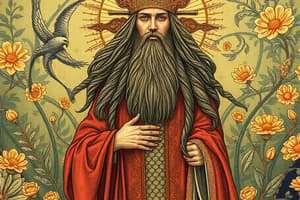Podcast
Questions and Answers
According to Plato, what did he compare the body and soul to?
According to Plato, what did he compare the body and soul to?
- A chariot and its driver (correct)
- A house and its owner
- A ship and its captain
- A horse and its rider
What is freewill?
What is freewill?
- The belief that human will is free and individuals can choose and act freely (correct)
- The belief that human actions are predetermined by an external force
- The belief that human actions are determined by physical laws
- The belief that human choices are determined by genetics
What is epistemology concerned with?
What is epistemology concerned with?
- The study of genetic determinism
- The study of physical determinism
- The study of scepticism
- The philosophical study of knowledge (correct)
What is scepticism characterized by?
What is scepticism characterized by?
According to Descartes, what were the 'three waves of doubt' that he famously tried to doubt?
According to Descartes, what were the 'three waves of doubt' that he famously tried to doubt?
What is the term for the belief that the human will is free, allowing human beings to choose and act freely?
What is the term for the belief that the human will is free, allowing human beings to choose and act freely?
Which philosophical theory holds that knowledge is gained through reason?
Which philosophical theory holds that knowledge is gained through reason?
What does the term 'dualism' refer to in philosophy?
What does the term 'dualism' refer to in philosophy?
Which term refers to the process by which humans are given a soul?
Which term refers to the process by which humans are given a soul?
What does the term 'empiricism' emphasize about knowledge?
What does the term 'empiricism' emphasize about knowledge?
Which term refers to the philosophical study of knowledge?
Which term refers to the philosophical study of knowledge?
Study Notes
Comparative Philosophy
- Plato compared the body and soul to a prisoner and a freedman, respectively.
Free Will
- Freewill is the ability to make choices that are not determined by external factors.
Epistemology
- Epistemology is concerned with the nature, sources, and limits of knowledge.
Scepticism
- Scepticism is characterized by a questioning attitude, doubting the possibility of knowledge.
Descartes' Three Waves of Doubt
- Descartes famously tried to doubt everything, including: • His senses (e.g., whether he was dreaming or awake) • Mathematical truths (e.g., whether 2 + 2 = 4) • His own existence (e.g., whether he was a thinking being)
Philosophical Theories
- The term 'libertarianism' refers to the belief that the human will is free, allowing human beings to choose and act freely.
- Rationalism is a philosophical theory that holds that knowledge is gained through reason.
- Dualism refers to the belief that the human being consists of two separate entities: the body and the soul.
- Traducianism is the term that refers to the process by which humans are given a soul.
Epistemological Emphases
- Empiricism emphasizes that knowledge is gained through experience and sensory data.
- The term 'epistemology' refers to the philosophical study of knowledge.
Studying That Suits You
Use AI to generate personalized quizzes and flashcards to suit your learning preferences.
Description
Test your understanding of key concepts in philosophy such as soul, dualism, freewill, and empiricism. Explore the fundamental ideas that shape our understanding of the human mind and existence.




